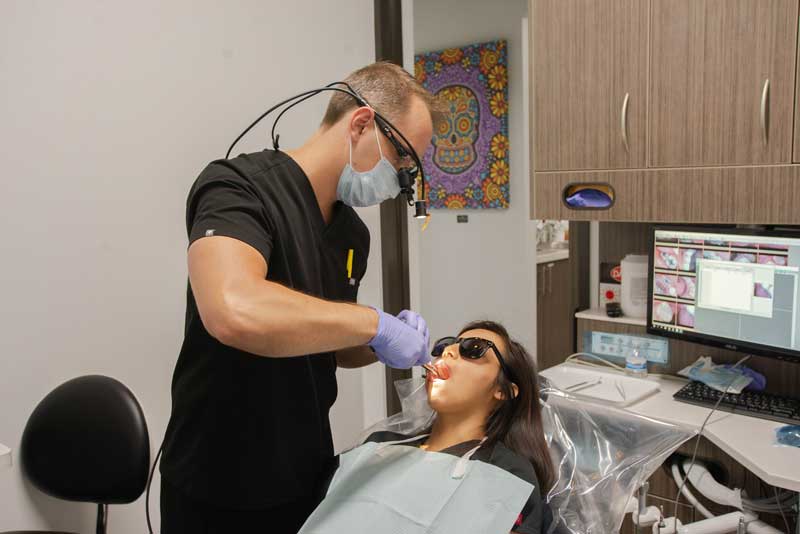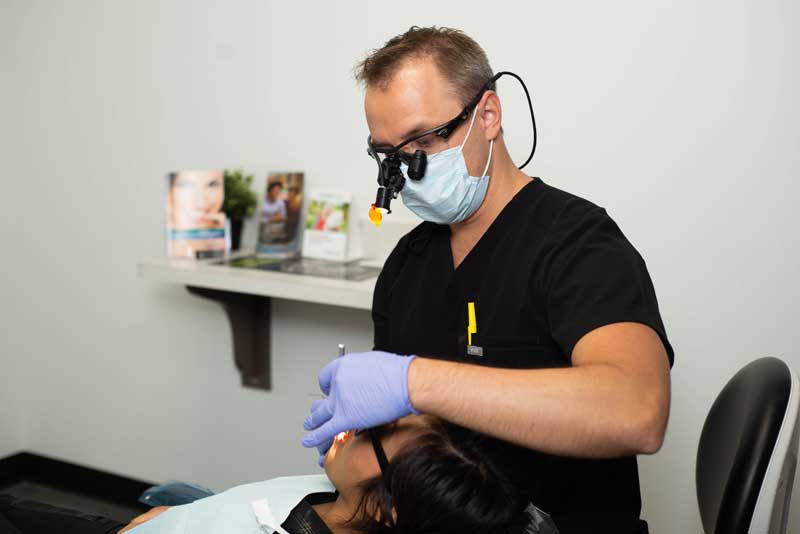Emergency Dental Extraction
Dental extraction, also known as tooth extraction Houston, can be necessary for various different situations. An emergency dental extraction may be necessary due to severe tooth decay, infections, or crowding. One or two teeth may need emergency dental extraction to make way for the other teeth as they move into position for those who obtain braces. At URBN Dental in Midtown and Uptown Houston, our expert dentists near Galleria only use dental extraction procedures as a last resort if necessary for oral health. Following the emergency dental extraction, we also offer several post-procedural aftercare tips and procedures with which you can replace the extracted tooth.
What is Dental Extraction?
Dental extraction, also known as tooth extraction, is simply the procedure by which your tooth is removed from its socket in the bone. This procedure is usually done if your tooth is damaged or broken beyond repair. In most cases, this procedure will only be attempted after your dentist has already tried fixing your teeth with fillings, crowns, or root canals. Dental specialists must remove the infected teeth to maintain oral health for patients receiving chemotherapy or preparing to get an organ transplant. However, in some cases, 24-hour emergency dental extraction is necessary to prevent the spread of diseases.

The necessity of 24-Hour Emergency Dental Extraction Near Me in Houston
In addition to stopping the spread of infections and diseases, 24-Hour emergency dental extraction near me can also be useful in the following situations:
- If you have an extra tooth that prevents other teeth from coming out properly.
- If your baby teeth refuse to fall out, make it difficult for permanent teeth to erupt naturally.
- A 24-hour emergency dental extraction may be necessary if you’re getting braces and need more room in your mouth.
- Sometimes, people receiving some form of radiation require Dental extraction, so there’s no tooth in the radiation path.
- Infected teeth past the point of saving the need to be extracted immediately because they can also infect other teeth and gums.
- During organ transplants, certain drugs are taken that lower the immune system, increasing your chances of infections. In this case, 24-hour emergency dental extraction near me may be necessary to remove the source of a possible infection.
- Wisdom teeth usually come out in the 20s, and they often have to be extracted because they damage surrounding teeth, are poorly angled, or if they have cysts and infections. Not removing wisdom teeth in time can lead to gum infections.
- Some people have a crowded mouth, because of which all of the teeth are crooked and misaligned. To straighten and align the teeth during cosmetic treatments, it may be necessary to extract some superfluous teeth.
How Soon Should I Seek Help in Case of a Dental Emergency?
Unless you are a dental professional yourself, you cannot tell whether a certain delay can result in unacceptable damage or not. Therefore, act without delay. Even a small delay can result in serious, irreversible loss. Your dental disease and infection could get worse if you don’t act promptly. Broken teeth cannot be grown again. Rush to your dentist for a physical examination, or if that is not possible in a short time, contact one on the telephone to seek advice. After listening to your description, your dentist may advise you to act immediately or give you an appointment.
Preparation for Emergency Dental Extraction
Preparation for emergency dental extraction usually starts with a simple x-ray, so your walk-in dentist can plan one of the best ways to remove your teeth without side effects. During this procedure, you must disclose your medical history and familial history of diseases, including a list of all the medications you are currently taking. You don’t know which details may interest your doctor, so it’s best to disclose everything.
During a wisdom tooth extraction, the x-ray will reveal the following details:
- How your wisdom teeth interact with surrounding teeth.
- Your upper teeth’s related to your sinuses.
- Your lower teeth are related to the inferior alveolar nerve in the jawbone.
- Presence of tumors, infections, or any bone disease.
Sometimes, the doctor may also prescribe antibiotics to be taken before or after the treatment. This is done in the following situations:
- If you have some infection.
- If you have a weak immune system.
- If the surgery is going to last long.
- If you’re suffering from some medical condition.
There are a few other tips you should follow before your 24-hour emergency dental extraction near me procedure:
- Don’t eat or drink anything for at least six or eight hours before the emergency dental extraction.
- If you’re suffering from a cold, cough, runny nose, or nausea, contact the doctor and let them know immediately. This may affect the emergency dental extraction treatment planned for you.
- Don’t smoke for at least a day before the surgery because it can lead to dry sockets.
Emergency Dental Extraction Procedure

Simple Dental Extraction
A simple dental extraction is used for teeth that can be seen clearly in the mouth. During this dental extraction near me procedure, the dentist will loosen the visible teeth using an elevator device. Following that, the dentist will use forceps to extract the teeth.
Surgical Dental Extraction
A surgical dental extraction is a fairly complex procedure used if the tooth hasn’t yet come out or has broken off at the gum line, i.e., if the crown isn’t visible. The oral surgeon or dentist will make a small incision in your gums during this dental extraction near me procedure. Following that, the tooth will be extracted from within the gums. In some cases, removing some of the bone around the tooth may also be necessary. After the dental extraction near me procedure, the dentist will stitch the incision.
Dental Extraction Aftercare
Following the 24-hour emergency dental extraction near me procedure, your dentist will give you thorough aftercare instructions. It’s incredibly important to follow these instructions to minimize the risk of side effects or complications.
- After the emergency dental extraction, bite down on a piece of gauze or cloth for about 30 minutes to staunch the bleeding and encourage clotting.
- Don’t talk too much, eat, or drink for at least two hours after the procedure.
- Once the bleeding subsides, drink lots of lukewarm or cold water.
- For the first few days after the emergency dental extraction, consume only soft foods or a liquid diet.
- Don’t brush or rinse your teeth for approximately twelve hours after the procedure. Once you start brushing, avoid the surgical area. While rinsing, use diluted mouthwash or salted water.
- Don’t spit or smoke while there’s still some bleeding.
- Take all prescribed medications.
- Be sure to contact your dentist if there’s an anomaly you haven’t already been warned about, such as persistent toothaches or bleeding.




